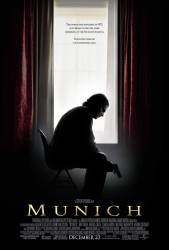Factual error: In the final scene with the New York skyline in the background, the new glass/stainless steel Manhattan complex at 731 Lexington Avenue is seen; this building is just being finished now in early '06. The building stands where Alexander's dept store once was. (On a related note, it is a nice touch on Spielberg's part to overlay the Twin Towers onto the skyline in that same scene.)
Factual error: The 5 German 'snipers' at the Munich airport are shown using G-3 rifles with scopes on them. In reality none of the 5 snipers had scopes on their rifles. The G3s used by the police were standard German Army issued rifles and lacked telescopic sights or any night-vision equipment. Their poor equipment contributed significantly to the failure of the rescue operation and prompted H&K to develop the PSG-1 sniper rifle.
Factual error: In the scene about half an hour into the film, just before the first assassination takes place, you see the person walking through a street, (it's supposed to be Rome but its shot in Budapest). In the background, to the right, you can see blue parking meters that are activated by SMS. This technology did not exist in 1973.
Factual error: When Avner is in London to try to kill Ali Hassan Salameh, vehicles are seen driving over a raised junction - a traffic calming measure, which wasn't introduced until more than 20 years later than 1973.
Factual error: In the background at Avner's debriefing is a water cooler. Israel's two earliest mineral water companies (Mei Eden and Neviot) weren't founded until the 1980s, so it is unlikely that there would have been such a water cooler there (assuming that the debriefing was taking place in the mid/late 1970s). (02:17:20)
Factual error: In the scene towards the end where Avner is speaking with his mother, there is a central-air-conditioning-type vent in the wall. It seems to me unlikely that an Israeli house/apartment in the 1970s would have had such a system. Air conditioning units were not very common and what would normally have been found was a single-piece unit installed through a wall. (02:20:00)






Answer: It's a bit difficult to find out this sort of information as not all films released disclose what they use to edit on. Michael Kahn is perhaps the most famous editor around to edit on flatbed machines and switched to digital editing for time constraints. Many film schools still teach and use flatbed editing so you may still see short films edited on film, just not feature length movies for a variety of reasons.
Lummie ★